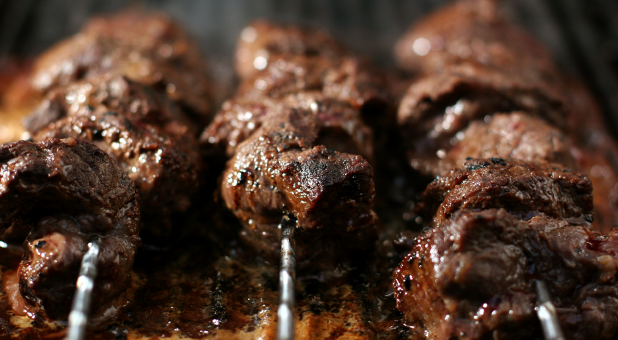Anti-cancer dietary fads are as common as the “Big C” is deadly. But how many trendy nutritional approaches that promise to lower your cancer risk are actually backed by solid scientific research?
To answer that question, the Physicians Committee for Responsible Medicine evaluated dozens of major studies involving diet and cancer to come up with six key science-based tips for eating healthy to reduce your risk for developing the disease.
The Washington, D.C.-based nonprofit group’s “Anti-Cancer Diet,” published in the Journal of the American College of Nutrition, is a combination of which foods to avoid and which to eat, based on studies reviewed by the World Cancer Research Fund and the American Institute for Cancer Research.
“Overall, evidence suggests that diets emphasizing foods from plant sources—vegetables, fruits, whole grains and legumes—are associated with lower cancer risk, as well as reduced risk for cardiovascular disease, diabetes and hypertension,” the PCRM report concludes.
“Plant-based diets tend to promote a healthy body weight, which, in turn, is associated with reduced risk of certain common forms of cancer. These suggested dietary recommendations are not a comprehensive dietary plan. Rather, they relate to specific areas where evidence is sufficiently compelling to merit dietary changes.”
Here are the organization’s six specific recommendations:
1. Eat more fruits and vegetables. Scores of studies involving tens of thousands of people have found that plant-based foods help lower the risk for many varieties of cancer (including throat, colorectal, stomach and breast cancers) as well as heart disease, high blood pressure and diabetes.
Fruits and vegetables are loaded with protective compounds, such as phytochemicals and antioxidants, and are also terrific sources of natural fiber, essential vitamins and minerals. Some, such as leafy greens and cruciferous vegetables like broccoli, even contain beneficial nutrients that can combat the toxic effects of pollutants and industrial chemicals, such as benzene, according to research by Johns Hopkins University.
PCRM’s conclusion: “Emphasizing fruits and vegetables in your diet will likely reduce the risk of several common forms of cancer [and] there are no disadvantages for healthy people eating more fruits and vegetables.”
2: Eat soy products. Soy products — such as tofu, edamame and tempeh — contain anti-cancer properties and, if substituted for red meat, can help reduce exposure to fats and other chemicals that promote breast cancer and other forms of the disease as well as cardiovascular problems.
One study cited by the researchers found that Chinese women who consumed a single serving of soy protein—about one cup of fortified soy milk, a half-cup of tofu or cooked soybeans—on a daily basis during adolescence had a 43 percent reduced risk of developing premenopausal breast cancer. Another recent study found that every additional serving of tofu consumed per week reduced the risk of breast cancer by 15 percent in Asian-Americans. Soy products have also been linked to improved bone health and reduced fracture risk in women
PCRM’s conclusion: “Consumption of soy products during adolescence may reduce the risk of breast cancer arising in adulthood. Soy products may also reduce the risk of recurrence and mortality for women previously treated for breast cancer.”
3. Limit dairy consumption. Several studies have linked dairy products to prostate cancer, potentially because of their calcium content, while some have suggested consuming dairy might prevent colorectal cancer. The researchers concluded that it is important to weigh those risks and benefits, and that men should limit or avoid dairy if they have a family history of prostate cancer, based on an analysis of 25 separate studies.
In one, the so-called Health Professionals Follow-Up Study, men consuming two milk servings per day were 60 percent more likely to develop prostate cancer than those who drank no milk, potentially by boosting calcium, which can suppress the action of vitamin D. They also noted limiting saturated fat and cholesterol intake from dairy products may decrease cardiovascular-disease risk.
PCRM conclusion: “Limiting or avoiding dairy products may reduce the risk of prostate cancer.”
4. Limit alcohol use. Many studies have concluded that moderate drinking (no more than one glass of beer or wine a day for women; two for men) can reduce the risk of heart disease—the nation’s No. 1 killer. But the PCRM report notes those benefits need to be weighed against research that shows heavy alcohol consumption can increase the risk of certain cancers in some people—notably cancers of the mouth, pharynx, larynx, esophagus, colon, rectum and breast.
Other factors may also compound those risks. For instance, mouth, pharynx and larynx cancers are rare in nonsmokers, so the heart-health benefits of alcohol may outweigh the risks for non-smokers.
PCRM’s conclusion: “Limiting or avoiding alcohol may reduce the risk of cancers of the mouth, pharynx, larynx, esophagus, colon and rectum and breast, [but] moderate alcohol use is associated with reduced risk of cardiovascular … and Alzheimer’s disease.”
5. Avoid red and processed meats. Limiting or avoiding red meat will not only reduce your risk of developing cancers of the colon and rectum, but also help prevent heart disease, stroke and diabetes, many studies have determined.
Research by the Harvard School of Public Health has found, for instance, that regular consumption of processed meats, such as sausages and cold cuts, will shorten your life. But PCRM notes that an occasional steak, burger or hot dog isn’t going to significantly raise your health risks.
PCRM’s conclusion: “Avoiding red and processed meat may reduce the risk of cancers of the colon and rectum … Red meat is a concentrated source of protein, iron and zinc. However, adequate intakes of these nutrients can easily be obtained in varied plant-based diets.”
6. Steer clear of grilled, fried and broiled meats. Cancer-causing chemicals called heterocyclic amines (HCAs) are created when creatine and amino acids in meat are cooked at high temperatures. Even the smoke from grilled meat can be harmful. Cutting back or avoiding such foods altogether can reduce the risk of cancers of the colon, rectum, breast, prostate, kidney and pancreas.
PCRM’s conclusion: “Avoiding grilled, fried and broiled meats may reduce the risk of cancers of the colon, rectum, breast, prostate, kidney and pancreas. In this context, “meat” refers to red meat, poultry and fish … Avoiding grilled, broiled and fried meats can reduce saturated fat and cholesterol intake, reducing the risk of cardiovascular disease. There are no disadvantages to avoiding meats cooked at high temperatures.”
The PCRM researchers also noted that diet is not the only factor involved in cancer risk. According to the World Health Organization, up to 30 percent of all cancers might be caused by a poor diet, but the rest are attributed to smoking, pollution and genetics, which can affect you no matter what you eat.
For the original article, visit newsmaxhealth.com.
See an error in this article?
To contact us or to submit an article



















